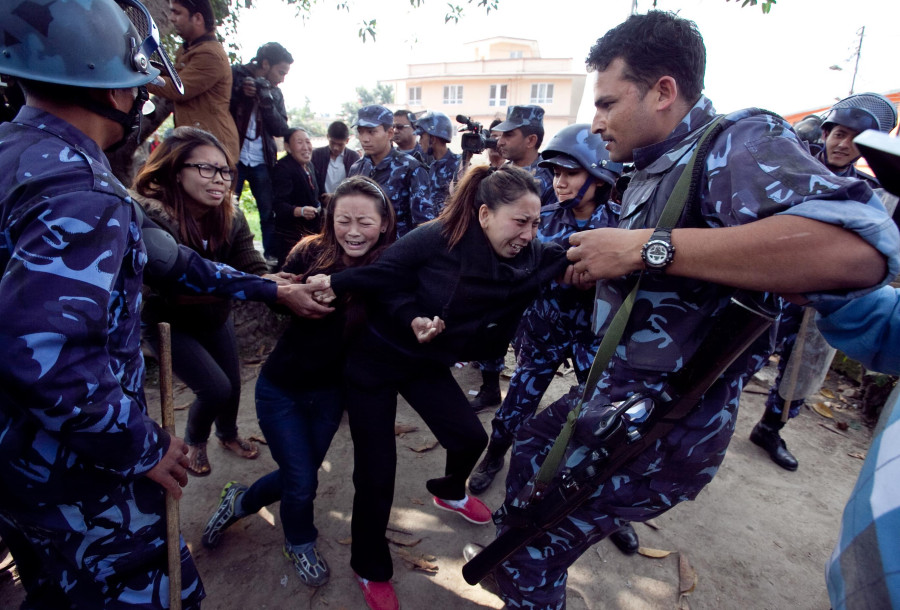National
Nepali citizens detained during Xi Jinping’s visit for Tibetan signage on clothes and accessories
All citizens have a right to political opinion and the right to criticise and protest Nepal’s foreign policy, irrespective of the country’s formal position, say rights activists.
Bhrikuti Rai
At least a week before Chinese President Xi Jinping was scheduled to arrive in Kathmandu, Nepal’s security forces were already on high alert, detaining dozens of people, primarily Tibetan refugees. But also caught in the dragnet were a number of Nepalis, who were taken into custody for sporting signage related to Tibet.
Although there were informal reports of numerous such instances, the Post was able to corroborate at least two incidents, one involving a 14-year-old Nepali girl and a 65-year-old Nepali woman who were both detained by police for their clothing and accessories. The teenager was wearing a shirt that said ‘Free Tibet’ and the woman was carrying a bag that had Tibetan lettering, which she couldn’t read.
The 14-year-old girl, who is from Gorkha, was called in for questioning to Boudha police station last week, a few days before Xi’s visit when she was spotted wearing a shirt that had Free Tibet emblazoned on it, according to Phurba Sherpa, her teacher who accompanied her to the police station. The seventh-grader was also asked to report the day after. But as she left for boarding school in Sundarijal, two male police officials went looking for her at the school last weekend. She was removed from school and taken to the Gagalphedi police station on the outskirts of Kathmandu.
According to Gagalphedi Police Station in-charge, Sub-Inspector Dev Prasad Bhattarai, they received an order from the Boudha Police Station to hold the minor in the station for the duration of Xi’s visit as she was wearing a Free Tibet shirt.
“We detained the minor last Saturday and Sunday for around six hours, as per orders from the Boudha Police Station,” Bhattarai told the Post.
Sherpa said that the minor was held in custody for two days but wasn’t “mistreated”.
“I was with her at the station all day and brought her back to the hostel in the evening just to sleep,” said Sherpa. “The police should have been considerate about keeping a child in the police station for just what she was wearing. This might have a psychological effect on her.”
Police say the arrests were part of their security exercise in view of a high profile visit.
“The dress worn by the girl was an indicator of being against the Chinese government during the Chinese president’s two-day visit in Nepal,” said Deputy Superintendent Ramesh Bahadur Singh of the Boudha Police Station. “We have repeatedly warned about this, and it wasn’t just the girl, we detained around 25 people during Xi’s visit and later released them.”
In the lead-up to Xi’s visits, police had admitted that only some of those arrested over the weeks were Tibetan refugees.
“Of the 18 people arrested for questioning, some are Tibetan refugees,” Deputy Superintendent Hobindra Bogati, spokesperson for the Kathamndu Metropolitan Police Range, had told the Post on October 11, a day before Xi’s arrival.
The Nepal Police regularly arrests Tibetans in Kathmandu for “questioning” during such high profile visits by Chinese officials, and increases surveillance in Tibetan refugee settlements during cultural celebrations like the Tibetan New Year or Tibetan spiritual leader-in-exile Dalai Lama’s birthday. But the police appear to have increased their arrest radius, even taking into custody Nepalis who might resemble Tibetans because of their ethnicity and live near Tibetan settlements.
The 65-year-old woman, who is from Marang village in Mustang, was taken into custody at around 8am from the Swayambhu area on Saturday, the day of Xi’s arrival, for carrying a bag with Tibetan lettering. She was held for more than 12 hours before being let go at 9pm, said Yangchen Loba, who hails from the same village. The woman, who cannot speak Nepali very well, was also asked to report to the police station the next day at 10am, 2pm and 6pm, said Loba.
“She’s afraid to even answer the phone now because it might be the police,” said Loba.
What is especially concerning is that Nepali citizens are being prevented from exercising their right to free speech, which is guaranteed by the constitution, according to human rights activists. All citizens have a right to political opinion and the right to criticise and protest Nepal’s foreign policy, irrespective of what the country’s formal position is on certain issues, say rights activists.
“Speaking about Tibet or Kashmir in Nepal isn’t a crime because it doesn’t undermine Nepal’s sovereignty,” said Taranath Dahal of Freedom Forum, a civil liberties organisation. “It was absolutely wrong to harass people simply for what they said or wore.”
Human rights activists say the arrest of Nepali citizens and Tibetans last week before and during Xi’s visit was simply a result of Nepal’s stance on Tibetan refugees in Nepal which has hardened over the years.
Earlier in May, three journalists from the Rastriya Samachar Samiti, Nepal’s national news agency, were investigated by the Ministry of Communication for translating and disseminating a wire report about the Dalai Lama’s health. Later, in June, the Samajbadi Party Nepal suspended its lawmaker Pradip Yadav for six months, more than 45 days after he attended a programme on Free Tibet in Europe without informing the party.
During Xi’s visit, Nepal and China signed the Treaty on Mutual Legal Assistance in Criminal Matters and China has pushed for the signing of an Extradition Treaty. Refugee rights activists fear that an extradition treaty could be used against Tibetans in Nepal.
“There is visible discrimination towards Tibetan refugees in Nepal,” said Gopal Krishna Shiwakoti, former chairperson of the Asia-Pacific Refugee Rights Network. “We need to treat every single refugee group equally on humanitarian grounds. Safeguarding Tibetan refugees’ rights is wrongly perceived as annoying the Chinese, which is not true. That mindset needs to change in our politicians and bureaucrats.”
Shuvam Dhungana contributed to this report.




 16.12°C Kathmandu
16.12°C Kathmandu














